Times of Upheaval : Four Medievalists in Twentieth-Century Central Europe. Conversations with Jerzy Kłoczowski, János M. Bak, František Šmahel, and Herwig Wolfram / ed. by Pavlína Rychterová, Gábor Klaniczay, Walter Pohl, Paweł Kras.
Material type: TextPublisher: Budapest ; New York : Central European University Press, [2019]Copyright date: 2019Description: 1 online resource (396 p.)Content type:
TextPublisher: Budapest ; New York : Central European University Press, [2019]Copyright date: 2019Description: 1 online resource (396 p.)Content type: - 9789633863060
- 943.7/022072022 23
- D116.5
- online - DeGruyter
| Item type | Current library | Call number | URL | Status | Notes | Barcode | |
|---|---|---|---|---|---|---|---|
 eBook
eBook
|
Biblioteca "Angelicum" Pont. Univ. S.Tommaso d'Aquino Nuvola online | online - DeGruyter (Browse shelf(Opens below)) | Online access | Not for loan (Accesso limitato) | Accesso per gli utenti autorizzati / Access for authorized users | (dgr)9789633863060 |
Frontmatter -- Table of Contents -- Introduction -- Introducing Jerzy Kłoczowski -- Jerzy Kłoczowski in Conversation with Paweł Kras -- Introducing János M. Bak -- János M. Bak in Conversation with Gábor Klaniczay -- Introducing František Šmahel -- František Šmahel in Conversation with Pavlína Rychterová -- Introducing Herwig Wolfram -- Herwig Wolfram in Conversation with Walter Pohl -- Index
restricted access online access with authorization star
http://purl.org/coar/access_right/c_16ec
The volume unites conversations with four masters of Medieval Studies from east-central Europe: János Bak from Hungary, Jerzy Kłoczowski from Poland, František Šmahel from the Czech Republic, and Herwig Wolfram from Austria. The interviews, made by younger colleagues, reveal engaging life stories, with numerous observations, anecdotes and experiences. The four scholars grew up before and during the war, under Nazi occupation, emerged as young scholars in the difficult post-war period, and, for most of their careers worked in the shadow of the Iron Curtain, two of them spending most of their lifetimes under communist regimes. The conversations focus on ways in which open-minded young intellectuals became medieval historians under difficult circumstances, how they experienced the long shadows of totalitarian regimes with their acute sensitivity for historical change, and how their perceptions of the world around them reflected back on their approach to medieval history. The histories of their nations were broken, most of them ceased to exist and then were re-established during their lifetimes, came under foreign domination, were split up, or had their territories shifted. These changes affected these scholars' identities and patriotic feelings, and their present was reflected in the distant mirror of the medieval past.
Mode of access: Internet via World Wide Web.
In English.
Description based on online resource; title from PDF title page (publisher's Web site, viewed 20. Nov 2024)


